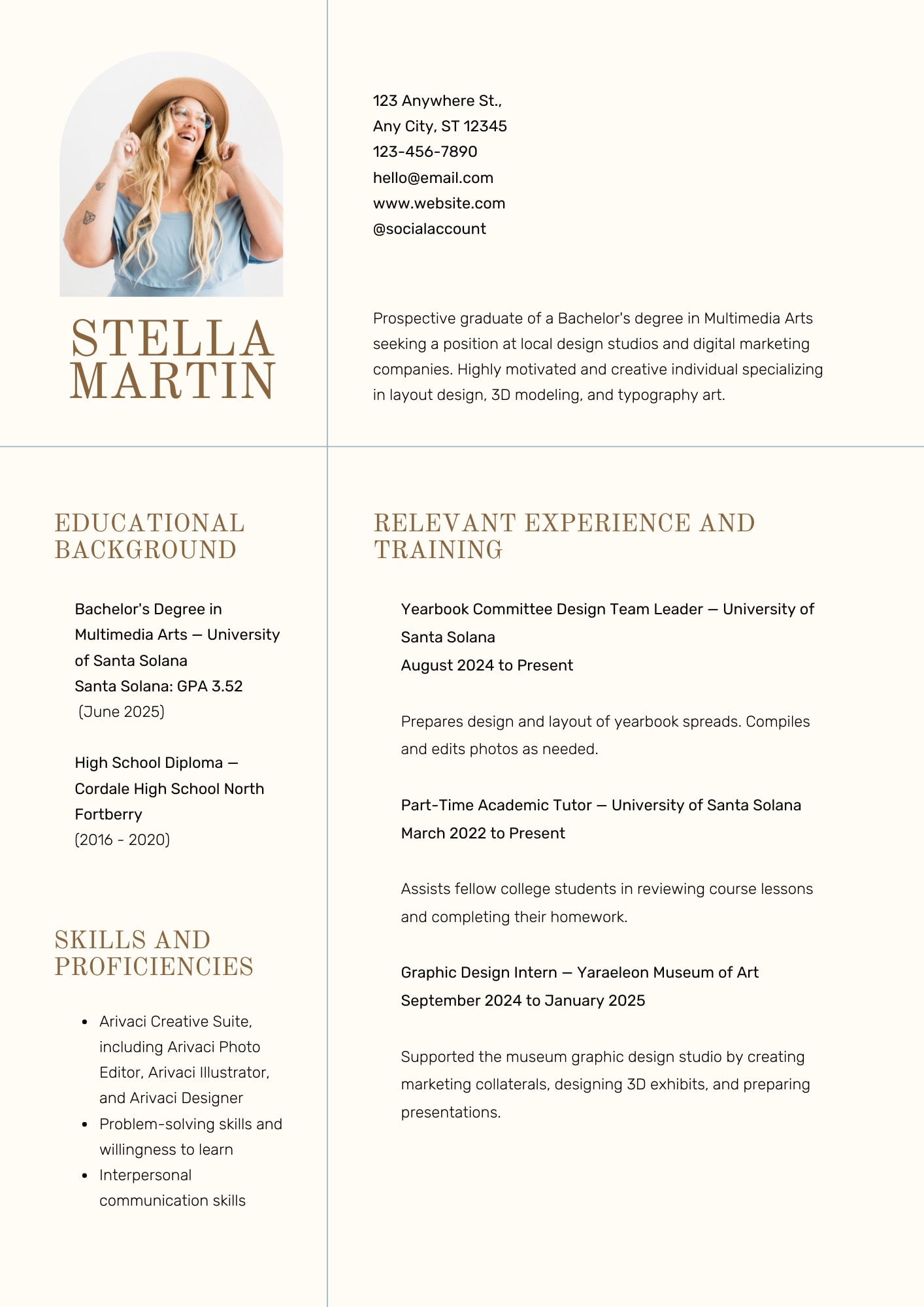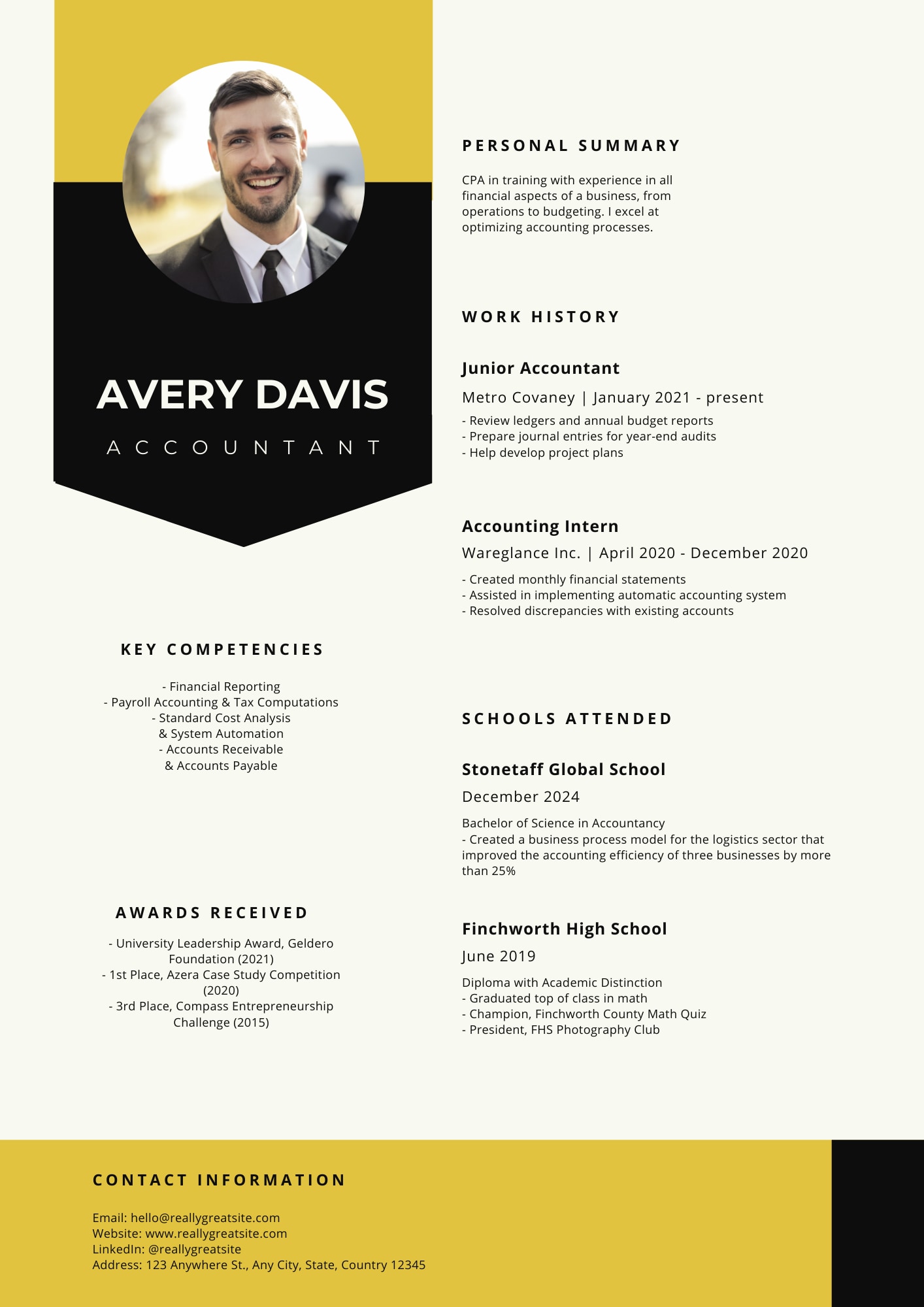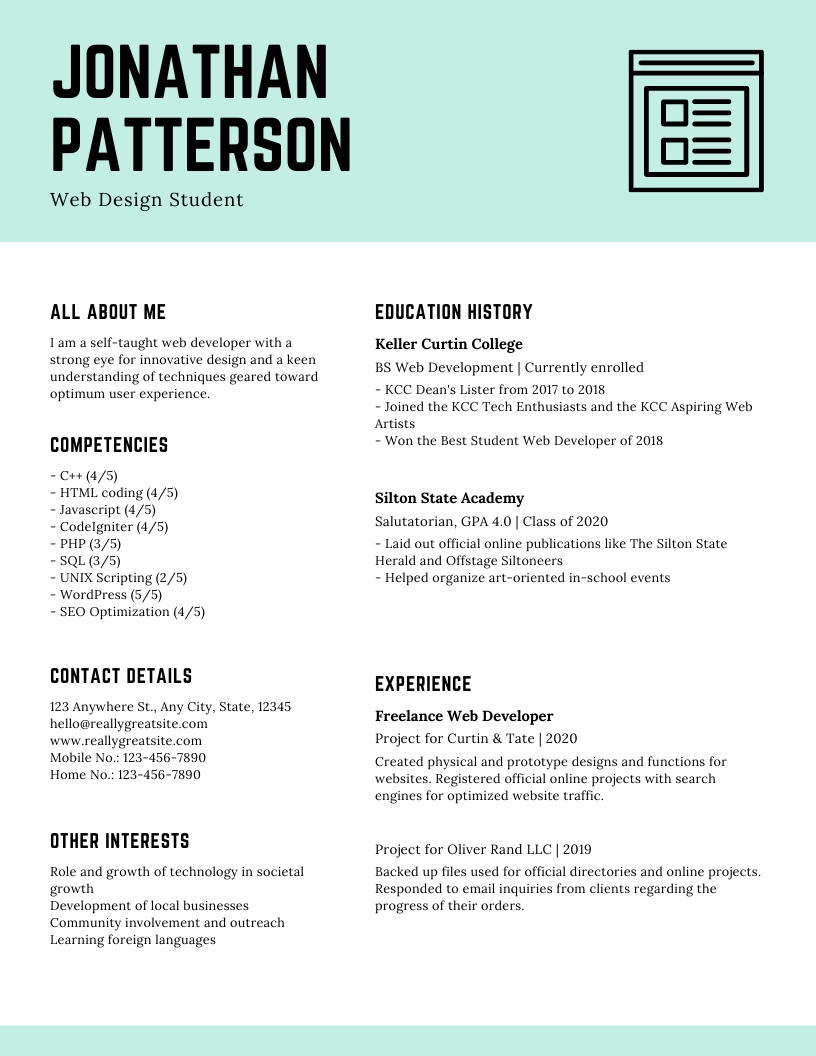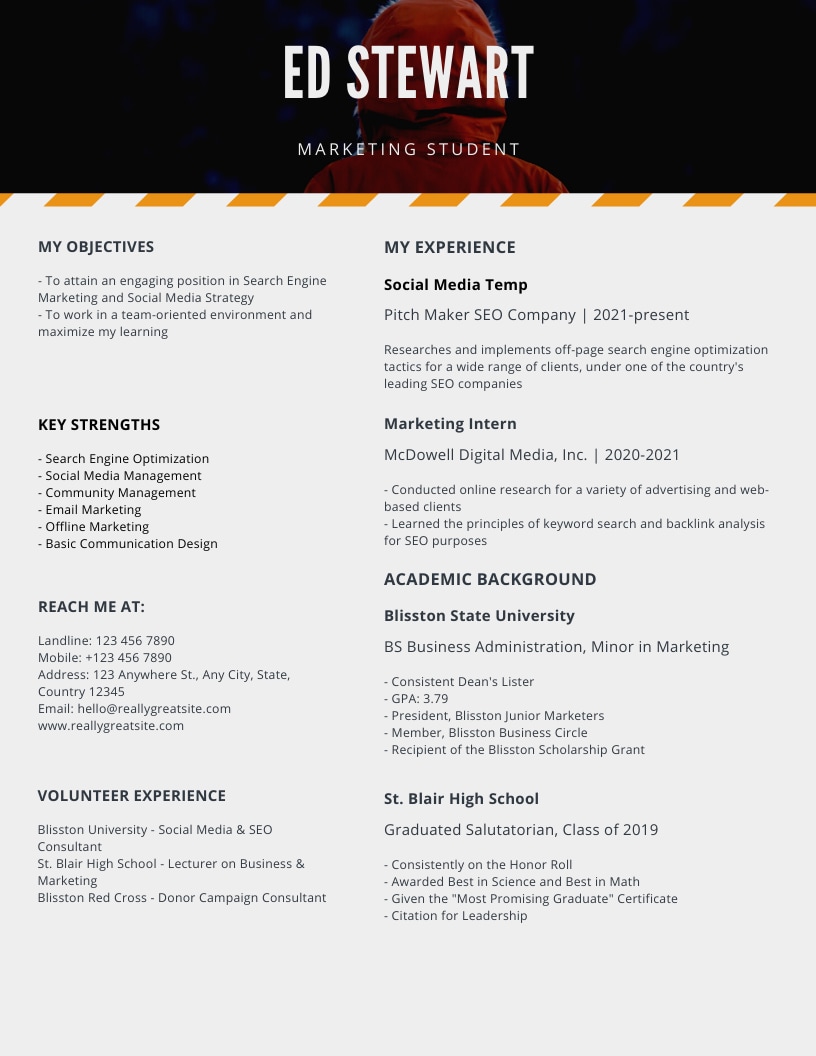How to Write a Resume When You’re Still in College (With Examples)

You know the battle. You need experience to get a job, but you need a job to get experience. It’s a conundrum many college students face when trying to start their careers. Searching through endless job postings that require at least two years of experience can be frustrating, but don’t get discouraged!
Here’s the good news. As a college student or recent grad, you’ve probably already developed a lot of the knowledge and qualifications to ready yourself for the professional world. Even without prior job experience, a college student can still create a strong impactful resume that gets employers’ attention. In fact, Career Alley confirms that most employers want to see evidence of leadership, problem-solving, and communication skills. Luckily, these are all things you can prove you’ve developed in college.
Ready to show hiring managers that you have what it takes to land your dream job? Here’s some handy college resume tips and examples to help.
1. Choose a well-organized resume format
In the past, classic resume formats followed a boring standard layout with limited flexibility. In today’s market, pertinent information and good design have set the standard for catching employers’ attention. Why not stand out from other candidates with a catchy design? If you're looking to get your creative juices going and develop a resume format that stuns while also fitting your aesthetic, Canva has some very cool designs to get you started. Check out this one by Stella.

According to Indeed, “The best resume formats are well organized with only the most relevant information and should make efficient use of blank space to avoid clutter.” Stella has made great use of the one-page space, even including a photo to showcase her unique style and personality. She’s also included a section labeled “Relevant Experience and Training” in place of the traditional “Job Experience” to emphasize her involvement in school teams and committees that have provided her with applicable skills in lieu of an official job.
Keep in mind that if you include a photo on your resume, it should reflect the style and dress for your industry. If you’re entering a more formal career, be sure to adjust your resume accordingly. You can still have a great design while keeping it professional, like in Avery’s resume below. As a new face in the accounting and finance world, Avery wants to make an impact on employers while still representing himself as a reputable professional. His resume stands out yet also does a great job of fitting the expectations and standards for his career.

2. Create a summary focused on the employer’s needs
A summary, objective, or “About Me” statement is an excellent way to introduce yourself and quickly advertise your qualifications. This statement should be brief (1-2 sentences) and focus on your relevant experience as well as your career-developed skills. It’s also a great idea to tailor your summary according to the employer’s needs, rather than your own. If the employer mentions specific desires in their job posting, figure out a way to incorporate the highest priority ones into your statement. Not only does this show the employer that you’ve paid attention to what they want, but also that you're responsive and willing to meet their needs.
3. Prioritize education vs. experience
For college students or recent graduates, it can be difficult to decide whether to list your education or experience first. Notice in Jonathan’s resume below, he lists his education history first to showcase his student activity and accolades, like the Best Student Web Developer Award. That’s because his educational accomplishments demonstrate more enthusiasm and mastery of his technical abilities than his limited experience as a freelance web developer – with just two work projects completed.

Not sure whether to list your education or experience section first? Figure out which one allows you to present your most pertinent and remarkable information. If your main selling points come from your college experience, then be sure to list your education section first. Then you can get really creative in emphasizing your academic history and accomplishments, as discussed next.
4. Get resourceful in your education section
Don’t feel intimidated if your degree doesn’t exactly align with the job you’re applying. By showing a commitment to your education, you can still demonstrate the qualities employers are looking for like strong work ethic, dedication, leadership, commitment, and desire to improve.
According to Live Career, “Not only should the education section of your resume be concise, but it should also relate to the job you are seeking.” This is a good time to brainstorm and make a list of your best student accomplishments. Any relevant honors or academic recognition, coursework, activities, or other achievements obtained during your education should be included to build up what may be lacking in your experience section. You can even add in relevant coursework and school projects you’ve completed to establish your training qualifications and special areas of study, particularly if your major or minor doesn’t readily indicate it.
5. Keep your experience section relevant
Employers don’t need to know about the summer job you had at a pizza shop or about that one time you sold perfume at the mall. Your experience section shouldn’t be limited to just paid jobs nor does it need to include every job you’ve ever had. Hiring managers will be looking to see whether you have job experience that’s relevant to the position they are hiring.
In Jonathan’s resume above, notice how he only includes his work as a Freelance Web Developer. This is his only experience that’s relevant to the positions for which he’s applying. Jonathan doesn't need to include his part-time job stocking shelves at Costco or his sales associate position at Champ’s during his first year in college. Not only can that distract from his qualifications, but it can clutter up his resume and make it seem like he doesn’t understand the employer’s wants or needs.
If you have very limited or no work history at all, you can change the name of this section from “Work Experience” to “Relevant Experience.” Then add in internships, volunteer work, leadership experience, extracurricular activities or any other related involvement or training you can think of to compensate for your lack of workplace experience.
6. Include a skills or strengths section
Including a skills, key strengths, or competencies section on a resume is a great way to let employers know what hard skills and soft skills you bring to the table. Indeed defines hard skills as abilities specific to the job (like proficiency in technical software systems) and soft skills as abilities that can be applied in any job (like problem-solving and time management).
So how do you know which of your many talents to list on your resume? According to The Balance Careers, “Some skills are in high demand for employers hiring college graduates, and there are other skills that specifically relate to the job for which you're applying.” Try reviewing several job descriptions specific to the industry or role you’re applying. Be sure to focus on the key desires and requirements employers emphasize for candidates. Jot down a list of the ones that stand out, then review how their desired skills match your core competencies. From there, you can decide which key strengths to include on your resume.
Check out Ed Stewart’s “Key Strengths” section in the below resume. Notice how he only lists hard skills or technical abilities. This is a good move for Ed as he’s positioning himself as a Search Engine Marketing expert and targeting companies looking to hire someone with a technical approach to their marketing strategy. He also does a great job of keeping his bulleted section short and scannable. Bulleted lists should only include about 5-7 items, so be sure to add only the most important and relevant skills to your resume. Anything that you feel you’ve left off can be included in your cover letter.

7. Always submit a custom cover letter
Did you know around 250 resumes are submitted for each corporate job listing and only about five candidates will be called for an interview? According to Pongo, “without a cover letter, you're relying solely on your resume to make a big enough impact that the hiring manager will call you back for an interview.” As an applicant just starting out in the job market, you’ll need a good cover letter to make up for the lack of experience on your resume.
By submitting a custom cover letter specific to the company and role for which you’re applying, you can let employers know why they should hire you over a candidate with more experience. This is your chance to tell them that you’re a fast learner, hard worker, or willing to go the extra mile to gain experience and to help their company succeed. Don’t count on your resume to get you through the competition. By including a cover letter, you’ll get noticed quickly, show you’ve put in extra effort, and demonstrate how much you want the job. You only have 7.4 seconds to make an impression, so make it good!
8. Get a friend to proofread
After staring at the same resume and cover letter for hours, it can be easy to gloss over your own writing and mistakes that a fresh pair of eyes can detect. After completing these documents, try a few proofreading tricks like reading them slowly and out loud. Then, ask for help! You’d be surprised at what someone else may pick up on. TopResume states, “Have a friend — preferably one who writes for a living or studied English in college — review your resume for contextual spelling mistakes, missing punctuation, and inconsistencies in your resume format.” Once all final details are confirmed, then you’re ready to apply. Good luck!
Want to check out more college resume and cover letter examples? Zety has some excellent templates and guides. And check out this blog if you need help obtaining reference letters. At Pearson Accelerated Pathways, we love helping students on the journey to their brightest future and best career. We’d love to help you create your own college experience that develops the background qualifications and skills needed to land your dream job!
